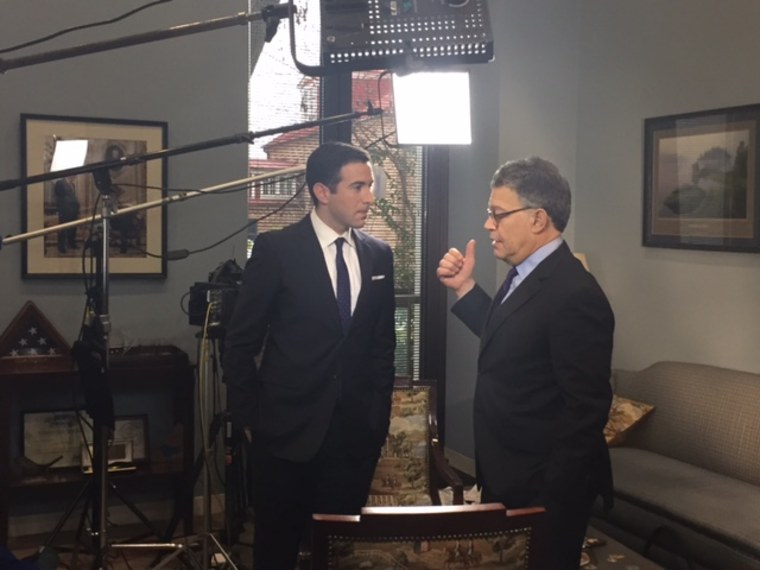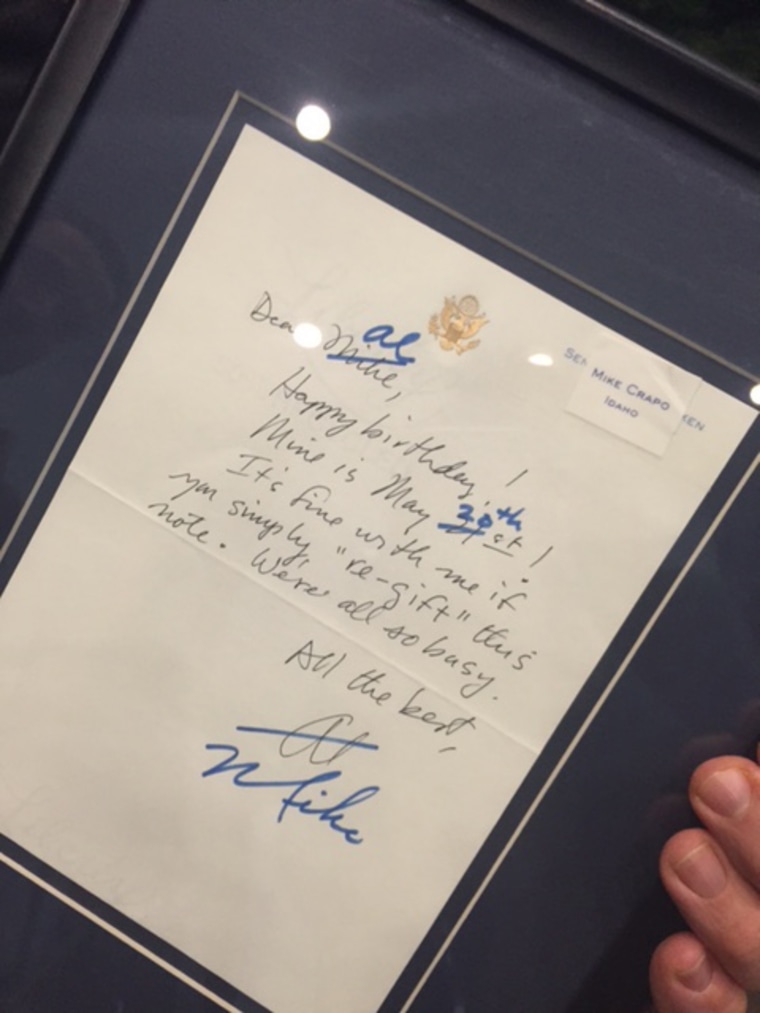Al Franken is on a roll. It's a busy Thursday in December as members of Congress prepare to leave town for the holidays, and Franken has just returned from the Senate floor, where he delivered a farewell speech for Alaska Senator Mark Begich.
Both men barely squeaked into the freshman class of 2008 – Begich won by 3,724 votes, Franken by 312 – but their political fates have diverged. Begich lost in the Democrats' bruising midterms, while Franken won by ten points. Franken talked about their paths to the Senate in a tribute that ranged from heartfelt to goofy, recounting how the former Anchorage mayor overcame his father's death in a plane crash, and why executive experience was so valuable in Washington.
"We need more mayors here," Franken said, "sometimes we say, we need more diversity, we need more women -- God knows we need more satirists!"
Coming from the former "Saturday Night Live" writer, the line drew laughs. It also revealed the sharp wit that Franken often kept sheathed in his first term. For the past six years, he has focused on policy and largely avoided national attention. That's led to the perception that he is using "all his actor's experience to seem measured and senatorial," as the New Yorker once put it, and this year the National Journal concluded Franken has been "dodging reporters" and "rarely granting interviews to national media outlets" in order "to prove he's a serious policymaker." That may be changing.
"We need more diversity, we need more women -- God knows we need more satirists!"'
Franken didn't hold back on hijinks in the farewell speech. He sassed Cory Booker for looking "smug" while he praised mayors, and then did a bit verging on parliamentary improv, responding to an aide who tried to correct him, during the speech, by whispering that Virginia Senator Tim Kaine was also a former mayor, having ran the city of Richmond.
"Who are you pointing at?" Franken mock-yelled at the aide, to chuckles on the floor. "You just kept saying 'Richmond,'" Franken continued, "and I go like, 'I don't know anybody named Richmond!'"
While just a passing moment, it demonstrated Franken's special ability to cut through the crap. Most national politicians live in a constant state of sublimated performance -- they are dependent on aides and speechwriters, but can't really acknowledge their existence. They constantly fear breaking character, since they're held to a 24-7 standard of "authenticity." Franken is different, he has more room to perform, and a knack for doing it while being natural. His entire career arc is an evolution of satire in reverse, since he went from parodying politics – his 1999 book, "Why Not Me?" spoofed an absurdist Franken candidacy – to practicing it. Having conquered the funny and the serious, now he may finally be ready to merge the two.
* * *
That was certainly the case as Franken sat down in his office for our msnbc interview.
When I mentioned that he barely won his first election, he deadpanned, "I don't think that's fair." Pressed on whether he'd vote for the budget despite provisions watering down Wall Street regulations, Franken parried with humor, saying simply, "I don't want to tell you," before breaking into laughter. (The reticence wasn't a political dodge; Franken broke with party leadership and voted against the budget this weekend.) And while he certainly didn't say he's changing his senatorial vibe, Franken told me voters have a much better sense of him now than when he first ran.

"One of the things that changed is that I had had a term behind me, and so I was able to build on what I had done," he says. "[Voters] knew me, and they knew I knew Minnesota," he proposes, "and that's very different than where I had been six years … previous -- where I'd been a comedian for SNL, and they didn't really know."
If Minnesotans are following Franken, they know he's focused on policy issues that aren't in the headlines.
He says economic populism also helped his re-election, citing issues like student loan debt, and he's used his chairmanship of an arcane Senate subcommittee on privacy and technology to push consumer rights in Silicon Valley. Lately that's meant battling with Uber, the ride-sharing app. The company has drawn heat for reports that it misused data on where customers travel and threatened journalists who criticized the company.
Related: The complicated politics of Uber
Franken recently challenged Uber to address questions about how it uses sensitive location data.
The company responded Monday, insisting it does not use its data to "discredit" opponents, and touting new written policies and an external review of its "data privacy program" in response to the recent problems.
Franken credited Uber for replying, but says "they did not answer many of the questions" he posed, and they failed to define their standards for "accessing" and "sharing customer data." Why is that data important?
Drawing on the analysis of leading privacy and legal experts, Franken says location data is crucial because it is a backdoor to revealing information that would otherwise be legally protected.
"It's taking your geo-location and storing it all the time," he says, describing how many apps track their users. "That information is very private -- where you are, where you go to the doctor, where you take your child to school, what you're doing on the weekend." Franken says companies that misuse that data pose a major, often unseen threat to Americans.
Beyond pressing those companies to explain themselves, Franken is also pushing a digital privacy bill that would force them to gain specific consent from users -- before any tracking, and before selling users' whereabouts to third parties. (Location-tailored ads are far more profitable.)
"Part of what my work has been doing is letting consumers understand what's out there," he says, "so you know what you are signing up for when you do some of this, and also letting the companies know that they have some obligation to have a privacy policy." (For its part, Uber only published its privacy policy for the first time in November, after the recent scandal.)
Franken emphasizes that his bill would compel a user-friendly consent beyond those lengthy "Terms of Service" policies, which most people click without reading.
"This is like on your smart phone, it would pop up, and it would say, 'This company is taking your geo-location data," he explains, "and keeping it and sharing it with third party.'" Many customers would still consent, Franken predicts, but others would not, especially for apps that have no good reason to track people in the first place.
As Americans are confronted by more and more discussion of entrenched violence against women, Franken's bill also aims to upgrade federal law to address a dark side of digital innovation.
It would ban so-called "stalker apps," which can be secretly installed on a phone to track a user's every movement.
Franken recounted the chilling story of a constituent who was contacted by her abusive partner the very moment she went to a domestic violence center, because he was using a stalker app to monitor her movements. (Stalking itself is illegal, but many of these apps are not.) Franken held hearings on that part of the problem this summer, and plans to re-introduce the bill in the next Congress.
"I think that Hillary would make a great president. I think, I certainly feel I haven’t announced that I’m supporting her, but does this count? I guess, maybe this counts."'
Franken is not only looking towards the new legislative session, but also the race for the White House. Citing Howard Dean's recent endorsement of Hillary Clinton, I asked whether it was good for the party to have leaders endorsing someone who hadn't even entered the race yet.
"I think that Hillary would make a great president," Franken replied. "I think, I certainly feel I haven’t announced that I’m supporting her, but does this count? I guess, maybe this counts."
But would he need to see who all the candidates are, I asked, before endorsing Clinton?
"No, no," Franken said, "I think that I’m ready for Hillary. I mean, I think that we’ve not had someone this experienced, this tough, and she’s very, very impressive."
Franken also made a point of bringing up Elizabeth Warren, who continues to attract grassroots calls to enter the race. Recalling how the Massachusetts senator was once a semi-regular guest on his "Air America" radio show, Franken said, "she is great, but she’s not running. She says she’s not running," adding, "I think Hillary would be great."
* * *
After our interview, Franken started showing me around his Senate office. There was a portrait of the late Minnesota Senator Paul Wellstone, a Christmas tree with handmade dream-catchers from local students, and pictures of Franken's days entertaining on U.S.O tours. Yet he seemed especially excited about a few basic-looking pieces of Senate stationary, marked with a few lines of chicken scratch, hanging in a frame near the door. Franken explained they were the product of a running joke he had with senators whose birthdays happened to fall near his.

The note to Mike Crapo, a very conservative Idaho Republican, read:
"Dear Mike, Happy Birthday! Mine is May 20th! It's fine with me if you simply 're-gift' this note.
We're all so busy. All the best, Al."
Senator Crapo had dutifully crossed out the name and birthdate, writing in "Al" and his own birthdate – and then he went the extra mile of cutting and pasting a piece of his personalized stationary over Franken's name in the upper right corner. He was committed. I only noticed this bit of senatorial arts and crafts because Franken pointed it out, chuckling.
Many commentators long for the "good old days" when politicians spent the evenings dining together. Steak dinners probably won't bridge what separates many members of this Congress, but a little laughter wouldn't hurt either. And an institution full of so many former class presidents can certainly use a class clown, even a very serious one.